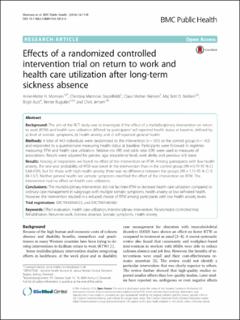| dc.contributor.author | Momsen, Anne-Mette H | |
| dc.contributor.author | Stapelfeldt, Christina Malmose | |
| dc.contributor.author | Nielsen, Claus Vinther | |
| dc.contributor.author | Nielsen, Maj Britt D | |
| dc.contributor.author | Aust, Birgit | |
| dc.contributor.author | Rugulies, Reiner | |
| dc.contributor.author | Jensen, Chris | |
| dc.date.accessioned | 2020-04-23T12:45:49Z | |
| dc.date.available | 2020-04-23T12:45:49Z | |
| dc.date.created | 2017-01-05T13:08:07Z | |
| dc.date.issued | 2016 | |
| dc.identifier.citation | BMC Public Health. 2016, 16 (1149), 1-11. | en_US |
| dc.identifier.issn | 1471-2458 | |
| dc.identifier.uri | https://hdl.handle.net/11250/2652244 | |
| dc.description.abstract | Background
The aim of the RCT study was to investigate if the effect of a multidisciplinary intervention on return to work (RTW) and health care utilization differed by participants’ self-reported health status at baseline, defined by a) level of somatic symptoms, b) health anxiety and c) self-reported general health.
Methods
A total of 443 individuals were randomized to the intervention (n = 301) or the control group (n = 142) and responded to a questionnaire measuring health status at baseline. Participants were followed in registries measuring RTW and health care utilization. Relative risk (RR) and odds ratio (OR) were used as measures of associations. Results were adjusted for gender, age, educational level, work ability and previous sick leave.
Results
Among all responders we found no effect of the intervention on RTW. Among participants with low health anxiety, the one-year probability of RTW was lower in the intervention than in the control group (RR = 0.79 95 % CI 0.68-0.93), but for those with high health anxiety there was no difference between the groups (RR = 1.15 95 % CI 0.84-1.57). Neither general health nor somatic symptoms modified the effect of the intervention on RTW. The intervention had no effect on health care utilization.
Conclusions
The multidisciplinary intervention did not facilitate RTW or decrease health care utilization compared to ordinary case management in subgroups with multiple somatic symptoms, health anxiety or low self-rated health. However, the intervention resulted in a reduced chance of RTW among participants with low health anxiety levels. | en_US |
| dc.language.iso | eng | en_US |
| dc.publisher | BioMed Central | en_US |
| dc.relation.uri | art%3A10.1186%2Fs12889-016-3812-4.pdf | |
| dc.rights | Navngivelse 4.0 Internasjonal | * |
| dc.rights.uri | http://creativecommons.org/licenses/by/4.0/deed.no | * |
| dc.title | Effects of a randomized controlled intervention trial on return to work and health care utilization after long-term sickness absence | en_US |
| dc.type | Peer reviewed | en_US |
| dc.type | Journal article | en_US |
| dc.description.version | publishedVersion | en_US |
| dc.source.pagenumber | 1-11 | en_US |
| dc.source.volume | 16 | en_US |
| dc.source.journal | BMC Public Health | en_US |
| dc.source.issue | 1149 | en_US |
| dc.identifier.doi | 10.1186/s12889-016-3812-4 | |
| dc.identifier.cristin | 1421624 | |
| dc.description.localcode | Open Access This article is distributed under the terms of the Creative Commons Attribution 4.0 International License (http://creativecommons.org/licenses/by/4.0/), which permits unrestricted use, distribution, and reproduction in any medium, provided you give appropriate credit to the original author(s) and the source, provide a link to the Creative Commons license, and indicate if changes were made. The Creative Commons Public Domain Dedication waiver (http://creativecommons.org/publicdomain/zero/1.0/) applies to the data made available in this article, unless otherwise stated. | en_US |
| cristin.ispublished | true | |
| cristin.fulltext | original | |
| cristin.qualitycode | 1 | |

